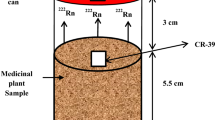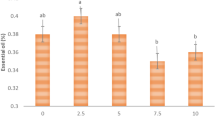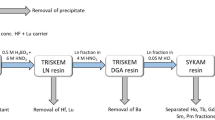Abstract
THERE are very few reports concerned with the effects of internal radioisotopes on the growth of plants. The growth of lateral roots of Zea mays is stopped with the addition of 10 µCi ml.−1 of 3H-thymidine1, whereas generally the growth of plants as a whole is not disturbed by doses of radioisotopes normally used for biochemical studies, even though injury, or even growth stimulation may occur in some cases2.
This is a preview of subscription content, access via your institution
Access options
Subscribe to this journal
Receive 51 print issues and online access
$199.00 per year
only $3.90 per issue
Buy this article
- Purchase on Springer Link
- Instant access to full article PDF
Prices may be subject to local taxes which are calculated during checkout
Similar content being viewed by others
References
Stein, O. L., and Quastler, H., Radiation Res., 21, 212 (1964).
Russel, R. S., in Handbuch der Pflanzenphysiologie (edit. by Ruhland, W.), 4, 100 (Springer-Verlag, Berlin, 1958).
Schneider, M. J., and Voth, P. D., and Troxler, R. F., Bot. Gaz., 128, 169 (1967).
Miller, M. W., and Sparrow, A. H., Rad. Bot., 5, 567 (1965).
Author information
Authors and Affiliations
Rights and permissions
About this article
Cite this article
MACHE, R., PATOURAUX, R. Radiosensitivity of the Liverwort Marchantia polymorpha L. to Internal Radioisotopes. Nature 241, 547–548 (1973). https://doi.org/10.1038/241547b0
Received:
Issue Date:
DOI: https://doi.org/10.1038/241547b0
Comments
By submitting a comment you agree to abide by our Terms and Community Guidelines. If you find something abusive or that does not comply with our terms or guidelines please flag it as inappropriate.



